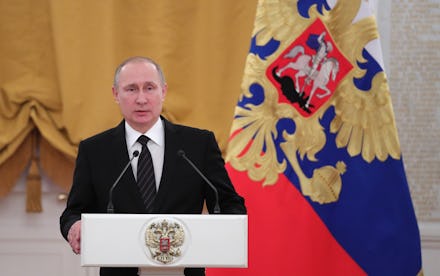Who are the Russians Obama just sanctioned, and what do those sanctions mean?

On Thursday, President Barack Obama imposed sanctions on Russia as punishment for the cyberattacks on the 2016 presidential election that the U.S. intelligence community unanimously agreed Russia was behind.
The sanctions apply to nine Russian entities and individuals, who the U.S. says were involved in the election-related hacks, and bar them from traveling to the United States, according to the New York Times.
The entities
The Main Intelligence Directorate, also known as the GRU, which the White House says launched cyberattacks "with the purpose or effect of interfering with the 2016 U.S. election processes."
The Federal Security Service, which the White House says aided the GRU in hacking the election.
The Special Technology Center, which the U.S. says aided the GRU in "conducting signals intelligence operations."
Zorsecurity, which the White House says provided "technical research and development" to the GRU.
And the Autonomous Noncommercial Organization, which the White House says "provided specialized training to the GRU."
The people
The U.S. also named four GRU officials — including high-ranking Russian military personnel — in their sanctions.
They are: Chief Igor Valentinovich Korobov, Deputy Chief Sergey Aleksandrovich Gizunov and First Deputy Chiefs Igor Olegovich Kostyukov and Vladimir Stepanovich Alexseyev.
Along with specifically sanctioning the individuals listed above, Obama expelled 35 Russian intelligence operatives from the U.S. who were "acting in a manner inconsistent with their diplomatic status," according to the White House.
The White House said these officials, who were working at the Russian Embassy in Washington, D.C., and the Russian Consulate in San Francisco, are now "persona non grata" — or unwelcome people. These officials and their families have 72 hours to leave the United States.
The United States is also closing two Russian compounds in Maryland and New York that the Washington Post said were "used for intelligence activities."
Mostly, however, these sanctions will provide a test to President-elect Donald Trump.
Instead of deciding whether to impose sanctions on Russia for the hacking, Trump would have to decide whether to lift them.
Trump seems to doubt that Russia was behind the hacks of the election that hit the Democratic National Committee and high-ranking staffers in his opponent Hillary Clinton's campaign. His doubts run counter to the unanimous belief of the U.S. intelligence community that Russia was the culprit.
Many members of Trump's own party, however, including Senate Majority Leader Mitch McConnell and House Speaker Paul Ryan, have said Russia's role should be investigated.